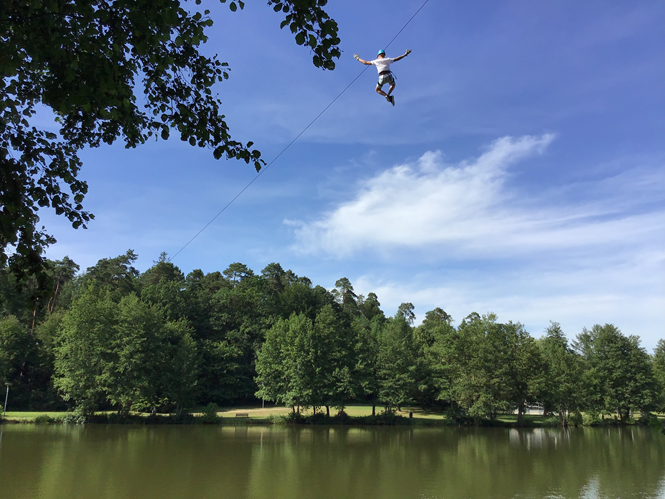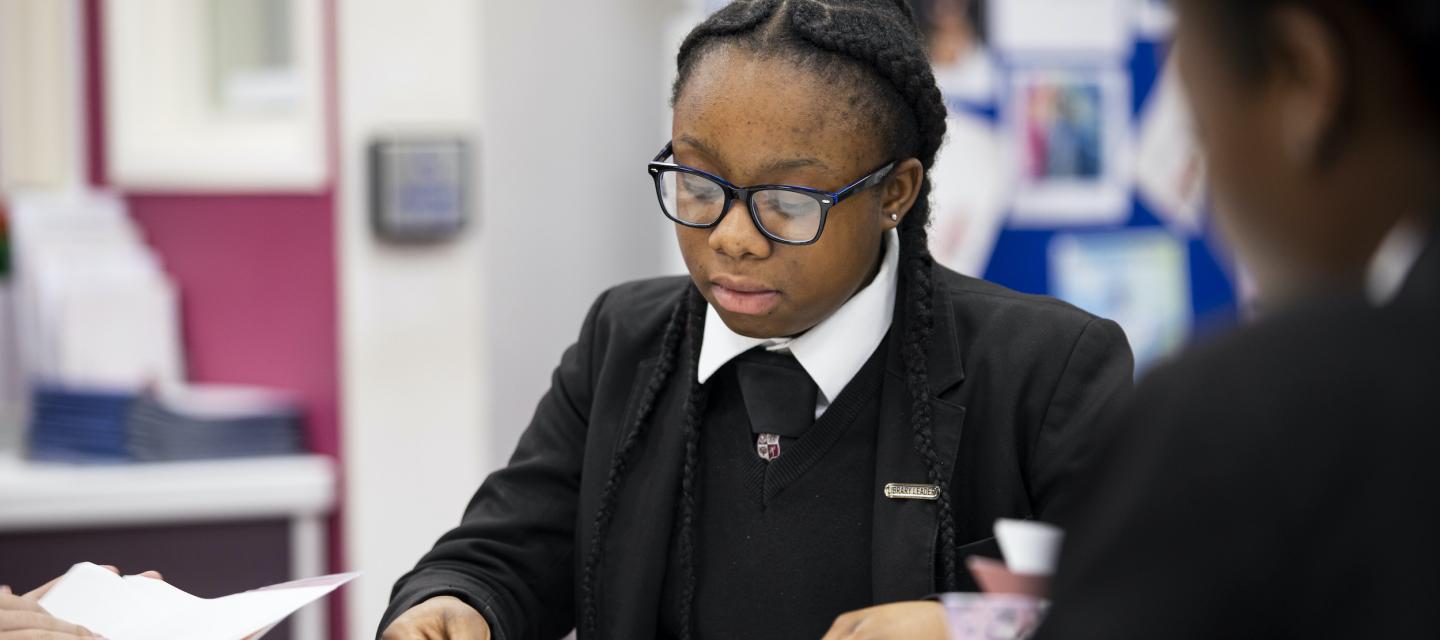The Modern Foreign Languages Team
The team is led by Ms Z. Edmondson, who specialises in German and French. She studied at the University of Southampton and spent her year abroad as an assistant in Wetzlar, in Germany and at the University of Picardy Jules Verne, in France.
The other members of the team are :-
Mr D. D’Arcy, who specialises in History and Spanish. He studied at the University of Southampton and spent his year abroad at the University of Malaga, in Spain.
Mrs S. Goodacre, who specialises in German and French. She studied at the University of Sheffield and spent her year abroad at the University of Belin, in Germany.
Mrs L. Stevens (part-time), who specialises in Spanish and French. She studied at Cardiff University and spent her year abroad at the University of Granada in Spain.
Mrs N. Sullivan, who specialises in German and French. She studied at the University of Kent at Canterbury and spent her year abroad at the University of Siena in Italy and the University of Jena in Germany.
Modern Foreign Languages at Noadswood
Modern Foreign Languages teaching is driven by passion about foreign languages and cultures, and is committed to engendering this enthusiasm in our pupils.
We regard languages as a skill for life and as enjoyable and rewarding to acquire, refine and deepen in complexity through study. We enhance pupils’ cultural awareness, whilst developing their language skills of listening, speaking, reading, writing and translation, without fear of failure and with increasing confidence and resilience.
The starting point is drawn from a child’s own experiences: name, age, family, pets etc, progressing to a variety of other topics, whereby students meet vocabulary and structures of increasing complexity, in order to understand securely and express themselves confidently therein.
At Noadswood we pride ourselves on the uniqueness of our MFL lessons and we craft them to be varied and engaging via interactive activities which pupils enjoy.
We also believe in the importance of grammar to enable pupils to manipulate and structure languages effectively and coherently.
Learning a language enhances pupils’ own and their new language, as well as their problem solving and communication skills, which are essential in every walk of life. Our curriculum and pedagogy are devised to enhance these skills across five years of study, alongside the language content, manipulation and the key skills of listening, speaking, reading, writing and translation. Gaining a qualification in a Modern Foreign Language can also enhance future employment prospects.
Year 7
Our year 7 pupils study French, German or Spanish on entry, with parents able to request a specific language, if there is a strong connection to a particular country, prior to their child starting in September. If there are any questions relating to language requests, please refer to Ms Z. Edmondson in the first instance.
Pupils follow a scheme of work in line with the National Curriculum, based on the Accès and Studio (French), Stimmt (German), Viva (Spanish) textbooks and on-line resources, supplemented by other resources including PowerPoints, songs, games and DVDs. The online resources provide skill practice in listening, speaking, reading, writing and translation, covering the topic areas listed below. Grammar and vocabulary are interwoven throughout the course and are revisited regularly, in new contexts.
Pupils’ learning is regularly assessed via a programme of common assessments, covering the four skill areas (listening, speaking, reading and writing).
| French | German | Spanish |
|---|---|---|
|
|
|
Year 8
In year 8 pupils continue with the language they started in year 7, following the National Curriculum. Our schemes of work are based on the Studio, Stimmt and Viva textbooks and on-line resources, supplemented by other resources including PowerPoints, songs, games and DVDs. The online resources provide skill practice in listening, speaking, reading, writing and translation, covering the topic areas listed below. Grammar and vocabulary are interwoven throughout the course and are revisited regularly, in new contexts.
Pupils’ learning is regularly assessed via a programme of common assessments, covering the four skill areas (listening, speaking, reading and writing).
| French | German | Spanish |
|---|---|---|
|
|
mealtimes/ordering a meal
|
Year 9
In year 9 pupils continue with the language they studied in year 7 and 8. Our scheme of work is based on acquiring transactional skills on the topic of holidays, broadening pupils’ cultural knowledge of festivals in the country of the language they are studying and finishing with a module based around a French, German or Spanish film.Grammar and vocabulary are interwoven throughout the course and are revisited regularly, in new contexts.
Pupils’ learning is regularly assessed via a programme of common assessments, covering different skills.
| French | German | Spanish |
|---|---|---|
Transactional holidays
Festivals
French film | Festivals
Transactional holidays
German film | Transactional holidays
Festivals
Spanish film |
Year 10
In year 10 pupils study French, German or Spanish to GCSE, based on the language they studied in years 7-9. For all three languages the exam board is AQA (Course codes - French 8652, German 8662, Spanish 8692).
We use the Studio, Stimmt and Viva textbooks and on-line resources, supplemented by other resources including PowerPoints, songs, games and DVDs. The online resources provide skill practice in listening, speaking, reading, writing and translation, covering the themes listed below. There is flexibility in the order in which themes are covered, so that learning can be personalised according to the ability and interest of the classes, including responding to what might occur in the news in a particular country or a current social issue. Grammar and vocabulary are interwoven throughout the course and are revisited regularly, in new contexts.
Pupils are assessed via terminal exams in listening, speaking, reading and writing, which take place at the end of year 11. All four skills are equally weighted and are worth 25% each.
| Theme 1: People and Lifestyle | ||
|---|---|---|
| Identity and relationships with others | Healthy living and lifestyle | Education and work |
| Theme 2: Popular Culture | ||
| Free time activities | Customs, festivals and celebrations | Celebrity Culture |
| Theme 3: Communication and the world around us | ||
| Travel and tourism, including places of interest | Media and technology | The environment and where people live |
In class we constantly offer support and extension activities to help reinforce and extend learning. We encourage students to seek help from us, either during the course of the lesson or outside of lesson times.
Year 11
In year 11 pupils study French, German or Spanish to GCSE, based on the language they studied in years 7-9. For all three languages the exam board is AQA (Course codes - French 8658, German 8668, Spanish 8698).
We use the Studio, Stimmt and Viva textbooks and on-line resources, supplemented by other resources including PowerPoints, songs, games and DVDs. The online resources provide skill practice in listening, speaking, reading, writing and translation, covering the themes listed below. There is flexibility in the order in which themes are covered, so that learning can be personalised according to the ability and interest of the classes, including responding to what might occur in the news in a particular country or a current social issue. Grammar and vocabulary are interwoven throughout the course and are revisited regularly, in new contexts.
Pupils are assessed via terminal exams in listening, speaking, reading and writing, which take place at the end of year 11. All four skills are equally weighted and are worth 25% each.
| Theme 1: Identity and Culture | |||
|---|---|---|---|
| Me, Family & Friends | Technology | Free time | Customs & traditions |
|
|
|
|
| Theme 2: Local, National, International, Global | |||
| Your home & region | Social issues | Global issues | Travel & tourism |
|
|
|
|
| Theme 3: Current & Future Study and Employment | |||
| My studies | Life at college | Post 16 education | Jobs, careers & ambitions |
|
|
|
|
In class we constantly offer support and extension activities to help reinforce and extend learning. We encourage students to seek help from us, either during the course of the lesson or outside of lesson times.
Extra-curricular opportunities
Whole school
We celebrate European Day of Languages. We run an inter-house “Spot the Teacher” competition, where members of staff wear badges for us (representing different aspects of European culture each year) and tutor groups have to identify the teachers and the badges they are wearing. The House with the most entries wins the European Day of Languages cup. Students answer the register in tutor time in a different language and we provide a tutor group quiz raising awareness of different languages and cultures. The canteen also supports us by making foods with a European theme.
German Exchange
Pupils studying German in years 9 and 10 have the fantastic opportunity to participate in a German Exchange with our partner school in Homburg in southwestern Germany. The German pupils come here and stay with our pupils’ families for a week and we then go over to Germany and stay with the German pupils’ families for a week. The best way to learn a language is to be fully immersed in it. This is an amazing chance for pupils to improve their language skills as well as to immerse themselves in the German culture and make new friends. Excursions with their exchange partner in Germany include visits to the Schlossberg caves, a climbing park in Jägersburg, the Roman city of Trier including a trip to the amphitheatre, Heidelberg including a trip to the castle. With their exchange partner, pupils will visit the school, participate in a games evening, go on excursions with their exchange partner’s family and enjoy a farewell party.

French Immersion Trip
Pupils in years 8, 9 and 10 have the amazing opportunity to take part in a 5-day French immersion trip to Le Touquet in northern France. This is a unique chance for pupils to improve their French and to learn about the French way of life through a variety of activities alongside a group of French teenagers. The best way to learn a language is to be fully immersed in it and to make friends with native speakers. With this in mind, pupils taking part in this trip will have a French Pen-Pal from a high school in the area of Le Touquet which will be visited during the trip. Excursions include a demonstration at a French Bakery, a visit to a Chocolate Factory, a Snail Farm, Nausicàa Sealife Centre and a visit to Parc Bagatelle, a French theme park. Activities with the French students include bilingual language games, a quiz, a scavenger hunt and a farewell party.
Spanish Immersion Trip
Pupils studying Spanish in years 7 and 9 have the exciting opportunity to take part in a 5-day Spanish immersion trip to El Puerto de Santa Maria, Cadiz in the southwest of Spain. This is a unique opportunity for pupils to improve their Spanish language and to learn about the Spanish way of life through various activities. The best way to learn a language is to be fully immersed in it, therefore pupils will have Spanish lessons with native speakers throughout their visit. Excursions include a trip to Parque Genoves Cadiz, Torre Tavira watchtower and a traditional Spanish market visit. Pupils will experience a Flamenco dance class, a paella cooking workshop and churros con chocolate.
